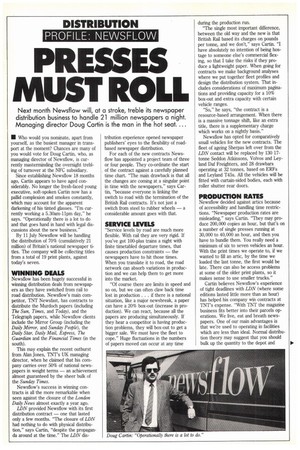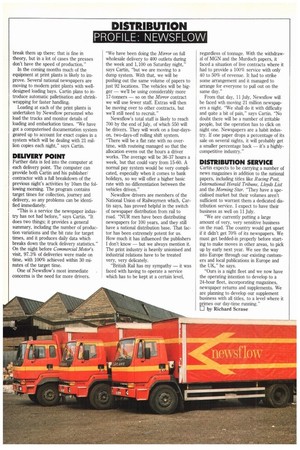PRESS MUST ROLL
Page 46

Page 48

If you've noticed an error in this article please click here to report it so we can fix it.
Next month Newsflow will, at a stroke, treble its newspaper distribution business to handle 21 million newspapers a night. Managing director Doug Cartin is the man in the hot seat....
• Who would you nominate, apart from yourself, as the busiest manager in transport at the moment? Chances are many of you would vote for Doug Cartin, who, as managing director of Newsflow, is currently masterminding the overnight trebling of turnover at the NFC subsidiary.
Since establishing Newsflow 18 months ago, Catlin appears to have aged considerably. No longer the fresh-faced young executive, soft-spoken Cartin now has a pallid complexion and smokes constantly, which may account for the apparent darkening of his tinted glasses. "I'm currently working a 5.30am-11pm day," he says. "Operationally there is a lot to do and that goes hand in hand with legal discussions about the new business."
By 11 July Newsflow will be handling the distribution of 70% (cumulatively 21 million) of Britain's national newspaper titles. The company will be collecting titles from a total of 19 print plants, against today's seven.
WINNING DEALS
Newsflow has been hugely successful in winning distribution deals from newspapers as they have switched from rail to road distribution. Newsflow's main competitor, TNT Newsfast, has contracts to distribute the Murdoch papers (including The Sun, Times, and Today), and the Telegraph papers, while Newsflow clients include the Mirror Group (including the Daily Mirror, and Sunday People), the Daily Star, Daily Mail, Express, The Guardian and the Financial Times (in the south).
This may explain the recent outburst from Alan Jones, TNT's UK managing director, when he claimed that his company carries over 50% of national newspapers in weight terms — an achievement almost guaranteed by the sheer bulk of the Sunday Times.
Newsflow's success in winning contracts is all the more remarkable when seen against the closure of the London Daily News almost exactly a year ago.
LDN provided Newsflow with its first distribution contract — one that lasted only a few months. "The closure of LDN had nothing to do with physical distribution," says Cartin, "despite the propaganda around at the time." The LDN dis tribution experience opened newspaper publishers' eyes to the flexibility of roadbased newspaper distribution.
For each of the new contracts Newsflow has appointed a project team of three or four people. They co-ordinate the start of the contract against a carefully planned time chart. "The main drawback is that all the changes are coming at a singular point in time with the newspapers," says Cartin, "because everyone is linking the switch to road with the termination of the British Rail contracts. It's not just a switch from steel to rubber wheels — a considerable amount goes with that.
SERVICE LEVELS
"Service levels by road are much more flexible. With rail they are very rigid. If you've got 100-plus trains a night with finite timetabled departure times, that causes production constraints — the newspapers have to hit those times. When you translate it to road, the road network can absorb variations in production and we can help them to get more into the market.
"Of course there are limits in speed and so on, but we can often claw back time lost in production. . if there is a national situation, like a major newsbrealc, a paper can have a 20% box-out (increase in production). We can react, because all the papers are producing simultaneously. If they hear a competitor is having production problems, they will box-out to get a bigger sale. We must have the fleet to cope." Huge fluctuations in the numbers of papers moved can occur at any time during the production run.
"The single most important difference, between the old way and the new is that British Rail based its charges on pounds per tonne, and we don't," says Cartin. "I have absolutely no intention of being hostage to someone else's commercial flexing, so that I take the risks if they produce a lightweight paper. When going for contracts we make background analyses where we put together fleet profiles and design the distribution system. That includes considerations of maximum paginations and providing capacity for a 10% box-out and extra capacity with certain vehicle ranges.
"So," he says, "the contract is a resource-based arrangement. When there is a massive tonnage shift, like an extra title, there is a supplementary charge which works on a nightly basis."
Newsflow has opted for comparatively small vehicles for the new contracts. The fleet of ageing Sherpas left over from the LDN contact will be replaced by 130 17tonne Seddon Atkinsons, Volvos and Leyland Daf Freighters, and 28 drawbars operating at 32 tonnes, based on ERFs and Leyland T45s. All the vehicles will be fitted with curtain-sided bodies, each with roller shutter rear doors.
PRODUCflON RATES
Newsflow decided against attics because of accessibility and handling time restrictions. "Newspaper production rates are misleading," says Cartin. "They may produce 200,000 copies an hour, but that's on a number of single presses running at 30,000 to 40,000 an hour, and then you have to bundle them. You really need a minimum of six to seven vehicles an hour. With the print times we operate to, if we wanted to fill an attic, by the time we loaded the last tonne, the first would be late. There can also be access problems at some of the older print plants, so it makes sense to use smaller trucks."
Cartin believes Newsflow's experience of tight deadlines with LDN (where some editions lasted little more than an hour) has helped his company win contracts at TNT's expense. "With TNT the magazine business fits better into their parcels operations. We live, eat and breath newspapers. One of our main advantages is that we're used to operating in facilities which are less than ideal. Normal distribution theory may suggest that you should bulk up the quantity to the depot and
break them up there; that is fine in theory, but in a lot of cases the presses don't have the speed of production."
In the coming months much of the equipment at print plants is likely to improve. Several national newspapers are moving to modern print plants with welldesigned loading bays. Cartin plans to introduce automatic palletisation and shrinkwrapping for faster handling.
Loading at each of the print plants is undertaken by Newsflow personnel who load the trucks and monitor details of loading and embarkation times. "We have got a computerised documentation system geared up to account for exact copies in a system which will be dealing with 21 million copies each night," says Carlin.
DELIVERY POINT
Further data is fed into the computer at each delivery point. The computer can provide both Cartin and his publisher/ contractor with a full breakdown of the previous night's activities by 10am the following morning. The program contains target times for collection, journey and delivery, so any problems can be identified immediately.
"This is a service the newspaper industry has not had before," says Cartin. "It does two things; it provides a general summary, including the number of production variations and the bit rate for target times, and it produces daily data which breaks down the truck delivery statistics." On the night before Commercial Motor's visit, 97.3% of deliveries were made on time, with 100% achieved within 30 minutes of the target time.
One of Newsflow's most immediate concerns is the need for more drivers.
"We have been doing the Mirror on full wholesale delivery to 400 outlets during the week and 1,100 on Saturday night," says Cartin, "but we are moving to a dump system. With that, we will be pushing out the same volume of papers to just 92 locations. The vehicles will be bigger — we'll be using considerably more 17-tonners — so on the Mirror contract we will use fewer staff. Extras will then be moving over to other contracts, but we'll still need to recruit."
Newsflow's total staff is likely to reach 700 by the end of July, of which 550 will be drivers. They will work on a four-dayson, two-days-off rolling shift system. "There will be a flat rate with no overtime, with routeing managed so that the allocation evens out the hours a driver works. The average will be 36-37 hours a week, but that could vary from 15-60. A normal pay system would be very complicated, especially when it comes to bank holidays, so we will offer a higher basic rate with no differentiation between the vehicles driven."
Newsflow drivers are members of the National Union of Railwaymen which, Cartin says, has proved helpful in the switch of newspaper distribution from rail to road. "NUR men have been distributing newspapers for 100 years, and they still have a national distribution base. That factor has been extremely potent for us. How much it has influenced the publishers I don't know — but we always mention it. The print industry is heavily unionised and industrial relations have to be treated very, very delicately.
"British Rail has my sympathy — it was faced with having to operate a service which has to be kept at a certain level, regardless of tonnage. With the withdrawal of MGN and the Murdoch papers, it faced a situation of live contracts where it had to provide a 100% service with only 40 to 50% of revenue. It had to strike some arrangement and it managed to arrange for everyone to pull out on the same day."
From that day, 11 July, Newsflow will be faced wth moving 21 million newspapers a night. "We shall do it with difficulty and quite a bit of pain," says Cartin. "No doubt there will be a number of irritable people, but the operation has to click on night one. Newspapers are a habit industry. If one paper drops a percentage of its sale on several nights, it will probably get a smaller percentage back — it's a highlycompetitive industry."
DISTRIBUTION SERVICE
Cartin expects to be carrying a number of news magazines in addition to the national papers, including titles like Racing Post, International Herald Tribune, Lloyds List and the Morning Star. "They have a specialised market but their volumes aren't sufficient to warrant them a dedicated distribution service. I expect to have their business as well on 11 July.
"We are currently putting a large amount of very, very sensitive business on the road. The country would get upset if it didn't get 70% of its newspapers. We must get bedded-in properly before starting to make moves in other areas, to pick up by early next year. We see the way into Europe through our existing customers and local publications in Europe and the UK," he says.
"Ours is a night fleet and we now have the operating intention to develop to a 24-hour fleet, incorporating magazines, newspaper returns and supplements. We are planning to develop our supplement business with all titles, to a level where it primes our day-time running." LJ by Richard Scrase
























































































































































